Communication Challenges in Children with Intellectual Disability
VerifiedAdded on 2020/12/31
|10
|3213
|50
Essay
AI Summary
This essay provides a comprehensive overview of intellectual disability, focusing on the speech, language, and communication challenges faced by children. It begins by defining intellectual disability and its impact on an individual's cognitive and behavioral functions, drawing on research from various scholars. The essay then delves into the causes of speech and language issues, including genetic factors and prenatal influences, while also examining the impact of these challenges on a child's learning and social development. It explores the importance of language development and the impact of speech and language difficulties on academic and social success. Furthermore, the essay details various intervention strategies, such as the use of multi-sensory approaches, early intervention programs, and psychotherapy, to support these children. It also highlights the roles of speech therapists, teachers, and parents in creating an environment that fosters effective communication and cognitive development. The essay concludes by emphasizing the importance of specialized programs, individualized education programs, and continuous training to improve the condition of intellectually disabled children, enabling them to communicate effectively with their families and peers.

ESSAY
Paraphrase This Document
Need a fresh take? Get an instant paraphrase of this document with our AI Paraphraser
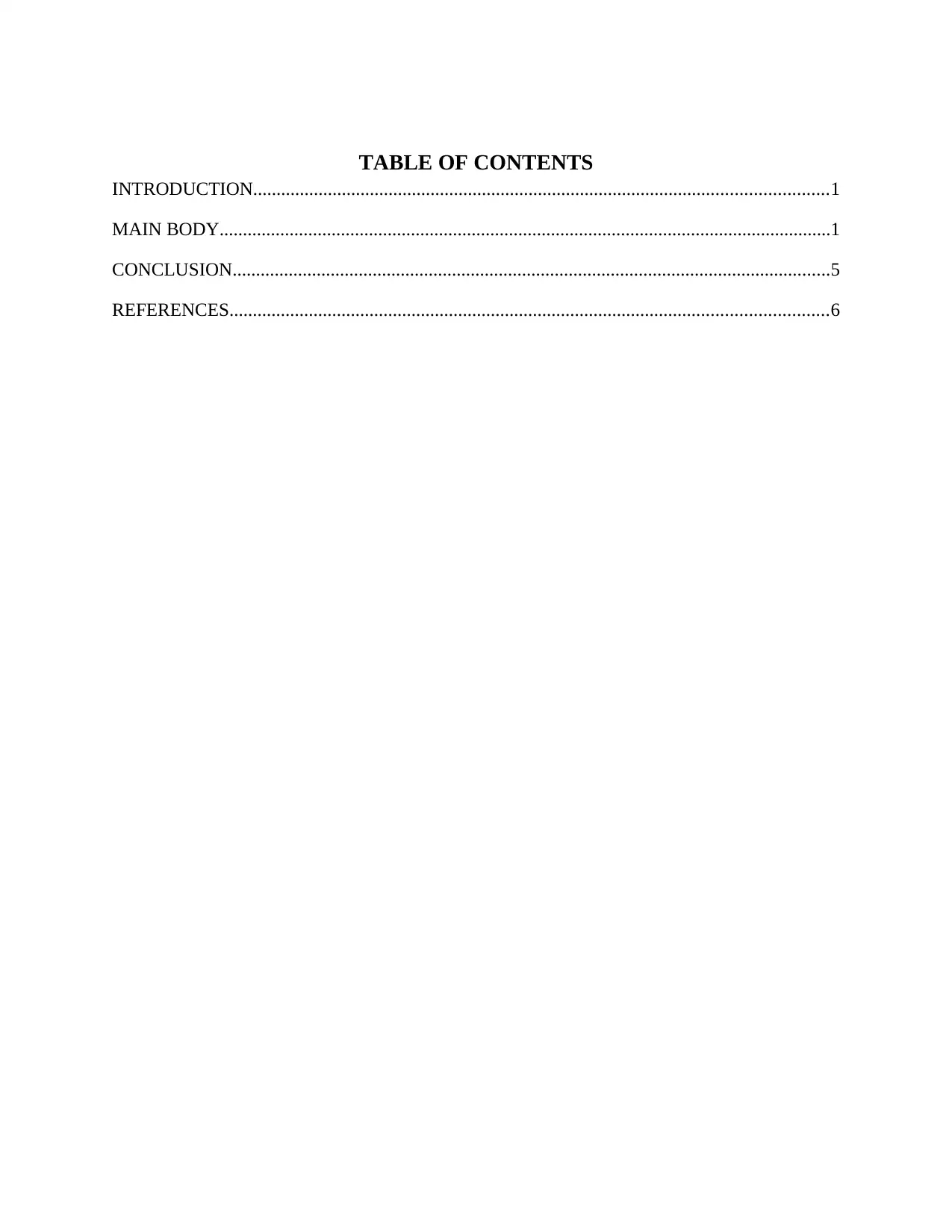
TABLE OF CONTENTS
INTRODUCTION...........................................................................................................................1
MAIN BODY...................................................................................................................................1
CONCLUSION................................................................................................................................5
REFERENCES................................................................................................................................6
INTRODUCTION...........................................................................................................................1
MAIN BODY...................................................................................................................................1
CONCLUSION................................................................................................................................5
REFERENCES................................................................................................................................6
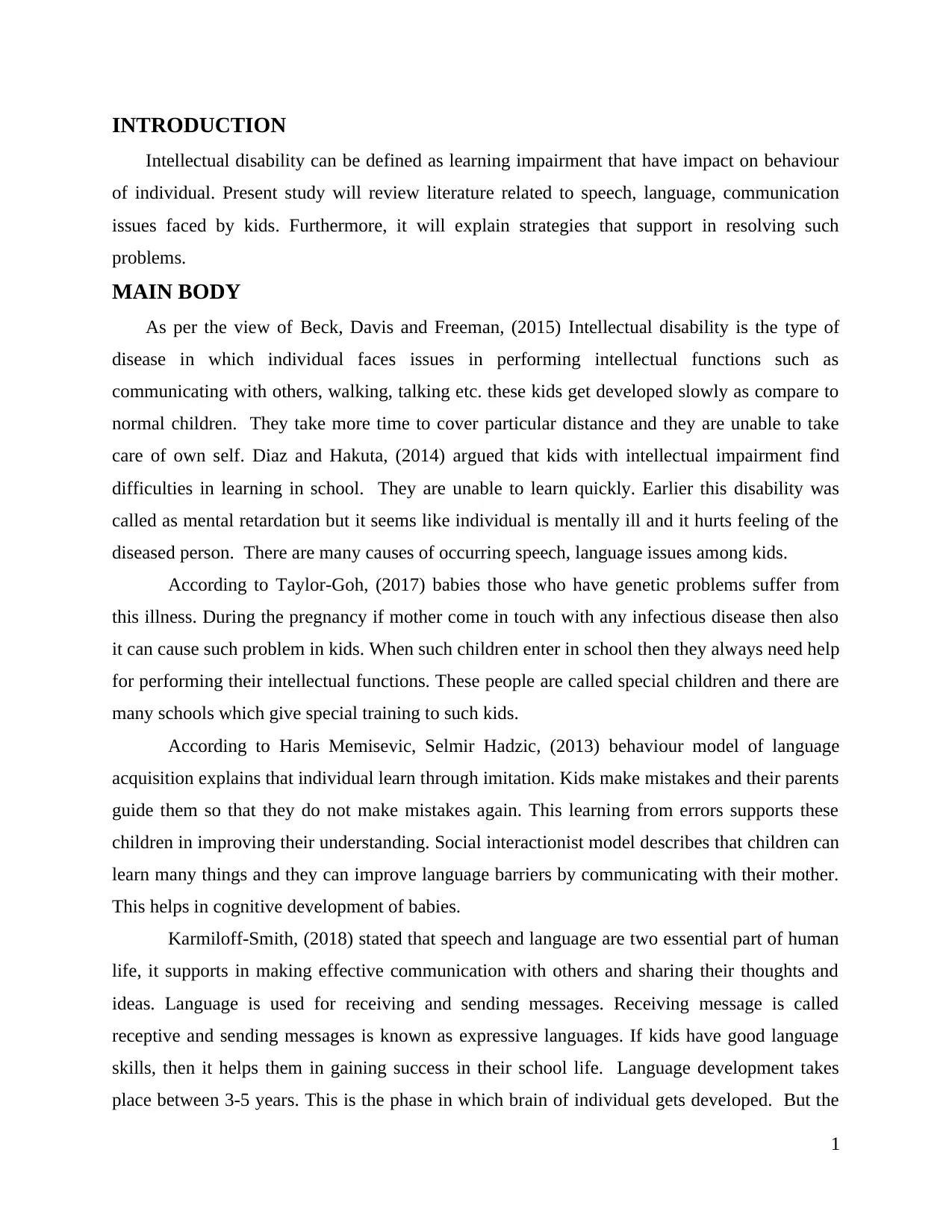
INTRODUCTION
Intellectual disability can be defined as learning impairment that have impact on behaviour
of individual. Present study will review literature related to speech, language, communication
issues faced by kids. Furthermore, it will explain strategies that support in resolving such
problems.
MAIN BODY
As per the view of Beck, Davis and Freeman, (2015) Intellectual disability is the type of
disease in which individual faces issues in performing intellectual functions such as
communicating with others, walking, talking etc. these kids get developed slowly as compare to
normal children. They take more time to cover particular distance and they are unable to take
care of own self. Diaz and Hakuta, (2014) argued that kids with intellectual impairment find
difficulties in learning in school. They are unable to learn quickly. Earlier this disability was
called as mental retardation but it seems like individual is mentally ill and it hurts feeling of the
diseased person. There are many causes of occurring speech, language issues among kids.
According to Taylor-Goh, (2017) babies those who have genetic problems suffer from
this illness. During the pregnancy if mother come in touch with any infectious disease then also
it can cause such problem in kids. When such children enter in school then they always need help
for performing their intellectual functions. These people are called special children and there are
many schools which give special training to such kids.
According to Haris Memisevic, Selmir Hadzic, (2013) behaviour model of language
acquisition explains that individual learn through imitation. Kids make mistakes and their parents
guide them so that they do not make mistakes again. This learning from errors supports these
children in improving their understanding. Social interactionist model describes that children can
learn many things and they can improve language barriers by communicating with their mother.
This helps in cognitive development of babies.
Karmiloff-Smith, (2018) stated that speech and language are two essential part of human
life, it supports in making effective communication with others and sharing their thoughts and
ideas. Language is used for receiving and sending messages. Receiving message is called
receptive and sending messages is known as expressive languages. If kids have good language
skills, then it helps them in gaining success in their school life. Language development takes
place between 3-5 years. This is the phase in which brain of individual gets developed. But the
1
Intellectual disability can be defined as learning impairment that have impact on behaviour
of individual. Present study will review literature related to speech, language, communication
issues faced by kids. Furthermore, it will explain strategies that support in resolving such
problems.
MAIN BODY
As per the view of Beck, Davis and Freeman, (2015) Intellectual disability is the type of
disease in which individual faces issues in performing intellectual functions such as
communicating with others, walking, talking etc. these kids get developed slowly as compare to
normal children. They take more time to cover particular distance and they are unable to take
care of own self. Diaz and Hakuta, (2014) argued that kids with intellectual impairment find
difficulties in learning in school. They are unable to learn quickly. Earlier this disability was
called as mental retardation but it seems like individual is mentally ill and it hurts feeling of the
diseased person. There are many causes of occurring speech, language issues among kids.
According to Taylor-Goh, (2017) babies those who have genetic problems suffer from
this illness. During the pregnancy if mother come in touch with any infectious disease then also
it can cause such problem in kids. When such children enter in school then they always need help
for performing their intellectual functions. These people are called special children and there are
many schools which give special training to such kids.
According to Haris Memisevic, Selmir Hadzic, (2013) behaviour model of language
acquisition explains that individual learn through imitation. Kids make mistakes and their parents
guide them so that they do not make mistakes again. This learning from errors supports these
children in improving their understanding. Social interactionist model describes that children can
learn many things and they can improve language barriers by communicating with their mother.
This helps in cognitive development of babies.
Karmiloff-Smith, (2018) stated that speech and language are two essential part of human
life, it supports in making effective communication with others and sharing their thoughts and
ideas. Language is used for receiving and sending messages. Receiving message is called
receptive and sending messages is known as expressive languages. If kids have good language
skills, then it helps them in gaining success in their school life. Language development takes
place between 3-5 years. This is the phase in which brain of individual gets developed. But the
1
⊘ This is a preview!⊘
Do you want full access?
Subscribe today to unlock all pages.

Trusted by 1+ million students worldwide
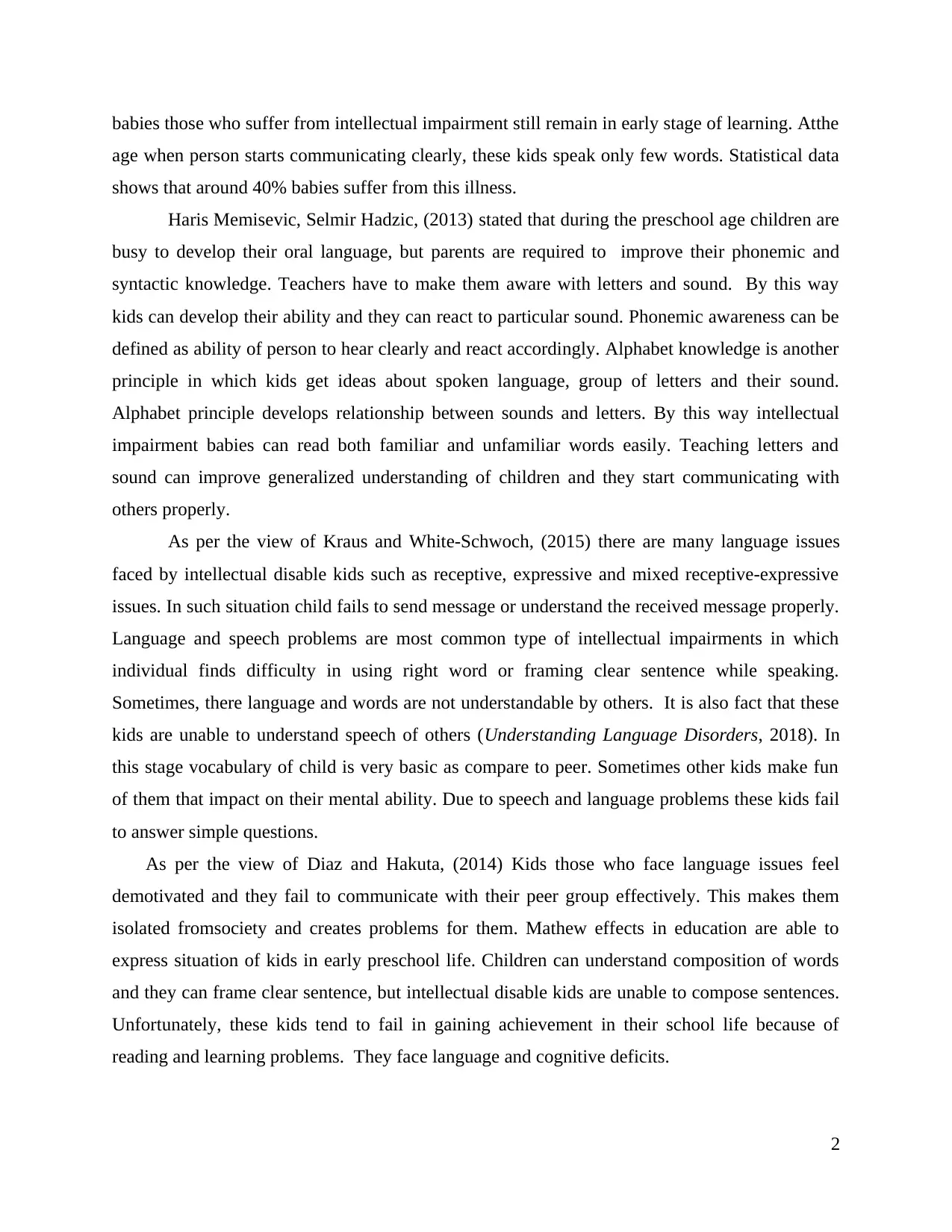
babies those who suffer from intellectual impairment still remain in early stage of learning. Atthe
age when person starts communicating clearly, these kids speak only few words. Statistical data
shows that around 40% babies suffer from this illness.
Haris Memisevic, Selmir Hadzic, (2013) stated that during the preschool age children are
busy to develop their oral language, but parents are required to improve their phonemic and
syntactic knowledge. Teachers have to make them aware with letters and sound. By this way
kids can develop their ability and they can react to particular sound. Phonemic awareness can be
defined as ability of person to hear clearly and react accordingly. Alphabet knowledge is another
principle in which kids get ideas about spoken language, group of letters and their sound.
Alphabet principle develops relationship between sounds and letters. By this way intellectual
impairment babies can read both familiar and unfamiliar words easily. Teaching letters and
sound can improve generalized understanding of children and they start communicating with
others properly.
As per the view of Kraus and White-Schwoch, (2015) there are many language issues
faced by intellectual disable kids such as receptive, expressive and mixed receptive-expressive
issues. In such situation child fails to send message or understand the received message properly.
Language and speech problems are most common type of intellectual impairments in which
individual finds difficulty in using right word or framing clear sentence while speaking.
Sometimes, there language and words are not understandable by others. It is also fact that these
kids are unable to understand speech of others (Understanding Language Disorders, 2018). In
this stage vocabulary of child is very basic as compare to peer. Sometimes other kids make fun
of them that impact on their mental ability. Due to speech and language problems these kids fail
to answer simple questions.
As per the view of Diaz and Hakuta, (2014) Kids those who face language issues feel
demotivated and they fail to communicate with their peer group effectively. This makes them
isolated fromsociety and creates problems for them. Mathew effects in education are able to
express situation of kids in early preschool life. Children can understand composition of words
and they can frame clear sentence, but intellectual disable kids are unable to compose sentences.
Unfortunately, these kids tend to fail in gaining achievement in their school life because of
reading and learning problems. They face language and cognitive deficits.
2
age when person starts communicating clearly, these kids speak only few words. Statistical data
shows that around 40% babies suffer from this illness.
Haris Memisevic, Selmir Hadzic, (2013) stated that during the preschool age children are
busy to develop their oral language, but parents are required to improve their phonemic and
syntactic knowledge. Teachers have to make them aware with letters and sound. By this way
kids can develop their ability and they can react to particular sound. Phonemic awareness can be
defined as ability of person to hear clearly and react accordingly. Alphabet knowledge is another
principle in which kids get ideas about spoken language, group of letters and their sound.
Alphabet principle develops relationship between sounds and letters. By this way intellectual
impairment babies can read both familiar and unfamiliar words easily. Teaching letters and
sound can improve generalized understanding of children and they start communicating with
others properly.
As per the view of Kraus and White-Schwoch, (2015) there are many language issues
faced by intellectual disable kids such as receptive, expressive and mixed receptive-expressive
issues. In such situation child fails to send message or understand the received message properly.
Language and speech problems are most common type of intellectual impairments in which
individual finds difficulty in using right word or framing clear sentence while speaking.
Sometimes, there language and words are not understandable by others. It is also fact that these
kids are unable to understand speech of others (Understanding Language Disorders, 2018). In
this stage vocabulary of child is very basic as compare to peer. Sometimes other kids make fun
of them that impact on their mental ability. Due to speech and language problems these kids fail
to answer simple questions.
As per the view of Diaz and Hakuta, (2014) Kids those who face language issues feel
demotivated and they fail to communicate with their peer group effectively. This makes them
isolated fromsociety and creates problems for them. Mathew effects in education are able to
express situation of kids in early preschool life. Children can understand composition of words
and they can frame clear sentence, but intellectual disable kids are unable to compose sentences.
Unfortunately, these kids tend to fail in gaining achievement in their school life because of
reading and learning problems. They face language and cognitive deficits.
2
Paraphrase This Document
Need a fresh take? Get an instant paraphrase of this document with our AI Paraphraser
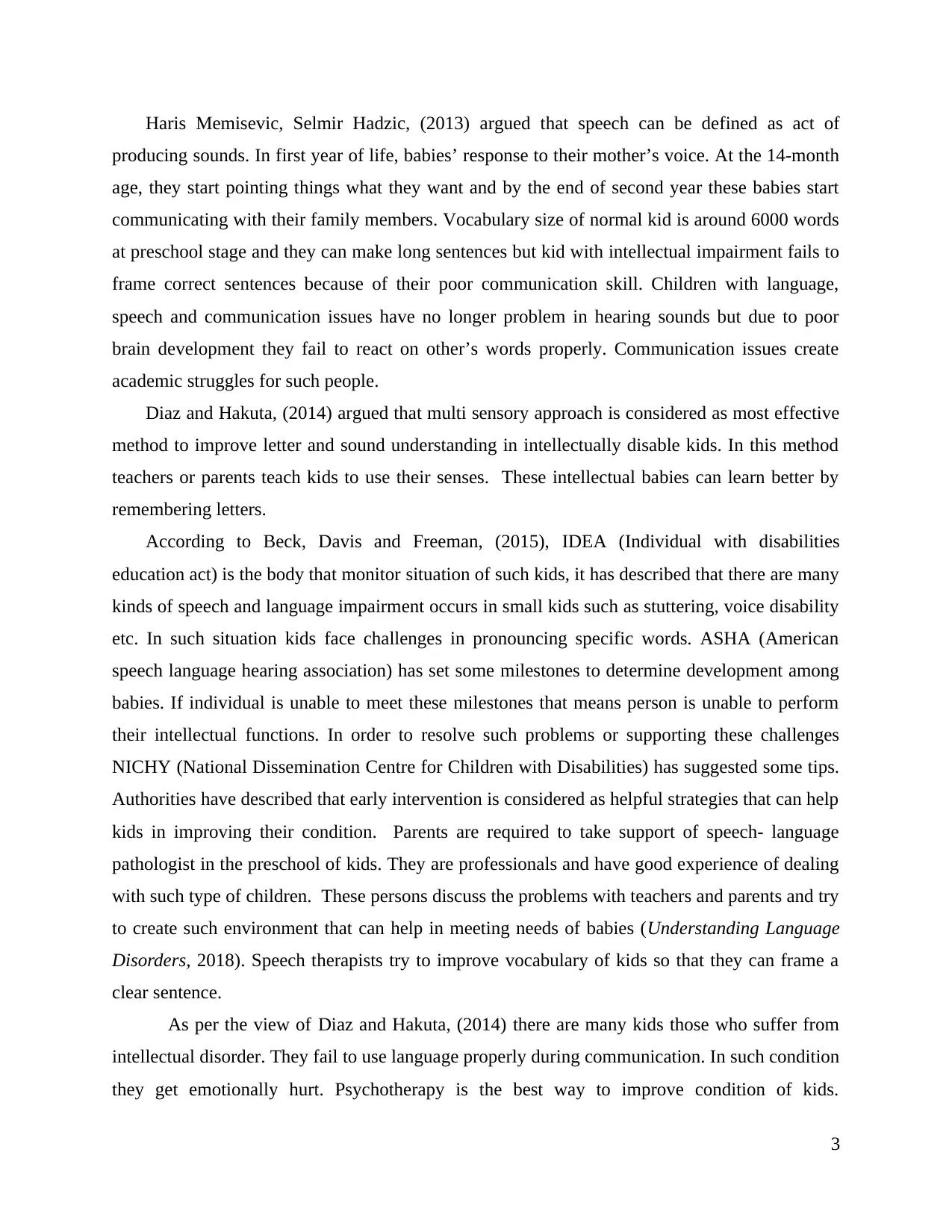
Haris Memisevic, Selmir Hadzic, (2013) argued that speech can be defined as act of
producing sounds. In first year of life, babies’ response to their mother’s voice. At the 14-month
age, they start pointing things what they want and by the end of second year these babies start
communicating with their family members. Vocabulary size of normal kid is around 6000 words
at preschool stage and they can make long sentences but kid with intellectual impairment fails to
frame correct sentences because of their poor communication skill. Children with language,
speech and communication issues have no longer problem in hearing sounds but due to poor
brain development they fail to react on other’s words properly. Communication issues create
academic struggles for such people.
Diaz and Hakuta, (2014) argued that multi sensory approach is considered as most effective
method to improve letter and sound understanding in intellectually disable kids. In this method
teachers or parents teach kids to use their senses. These intellectual babies can learn better by
remembering letters.
According to Beck, Davis and Freeman, (2015), IDEA (Individual with disabilities
education act) is the body that monitor situation of such kids, it has described that there are many
kinds of speech and language impairment occurs in small kids such as stuttering, voice disability
etc. In such situation kids face challenges in pronouncing specific words. ASHA (American
speech language hearing association) has set some milestones to determine development among
babies. If individual is unable to meet these milestones that means person is unable to perform
their intellectual functions. In order to resolve such problems or supporting these challenges
NICHY (National Dissemination Centre for Children with Disabilities) has suggested some tips.
Authorities have described that early intervention is considered as helpful strategies that can help
kids in improving their condition. Parents are required to take support of speech- language
pathologist in the preschool of kids. They are professionals and have good experience of dealing
with such type of children. These persons discuss the problems with teachers and parents and try
to create such environment that can help in meeting needs of babies (Understanding Language
Disorders, 2018). Speech therapists try to improve vocabulary of kids so that they can frame a
clear sentence.
As per the view of Diaz and Hakuta, (2014) there are many kids those who suffer from
intellectual disorder. They fail to use language properly during communication. In such condition
they get emotionally hurt. Psychotherapy is the best way to improve condition of kids.
3
producing sounds. In first year of life, babies’ response to their mother’s voice. At the 14-month
age, they start pointing things what they want and by the end of second year these babies start
communicating with their family members. Vocabulary size of normal kid is around 6000 words
at preschool stage and they can make long sentences but kid with intellectual impairment fails to
frame correct sentences because of their poor communication skill. Children with language,
speech and communication issues have no longer problem in hearing sounds but due to poor
brain development they fail to react on other’s words properly. Communication issues create
academic struggles for such people.
Diaz and Hakuta, (2014) argued that multi sensory approach is considered as most effective
method to improve letter and sound understanding in intellectually disable kids. In this method
teachers or parents teach kids to use their senses. These intellectual babies can learn better by
remembering letters.
According to Beck, Davis and Freeman, (2015), IDEA (Individual with disabilities
education act) is the body that monitor situation of such kids, it has described that there are many
kinds of speech and language impairment occurs in small kids such as stuttering, voice disability
etc. In such situation kids face challenges in pronouncing specific words. ASHA (American
speech language hearing association) has set some milestones to determine development among
babies. If individual is unable to meet these milestones that means person is unable to perform
their intellectual functions. In order to resolve such problems or supporting these challenges
NICHY (National Dissemination Centre for Children with Disabilities) has suggested some tips.
Authorities have described that early intervention is considered as helpful strategies that can help
kids in improving their condition. Parents are required to take support of speech- language
pathologist in the preschool of kids. They are professionals and have good experience of dealing
with such type of children. These persons discuss the problems with teachers and parents and try
to create such environment that can help in meeting needs of babies (Understanding Language
Disorders, 2018). Speech therapists try to improve vocabulary of kids so that they can frame a
clear sentence.
As per the view of Diaz and Hakuta, (2014) there are many kids those who suffer from
intellectual disorder. They fail to use language properly during communication. In such condition
they get emotionally hurt. Psychotherapy is the best way to improve condition of kids.
3
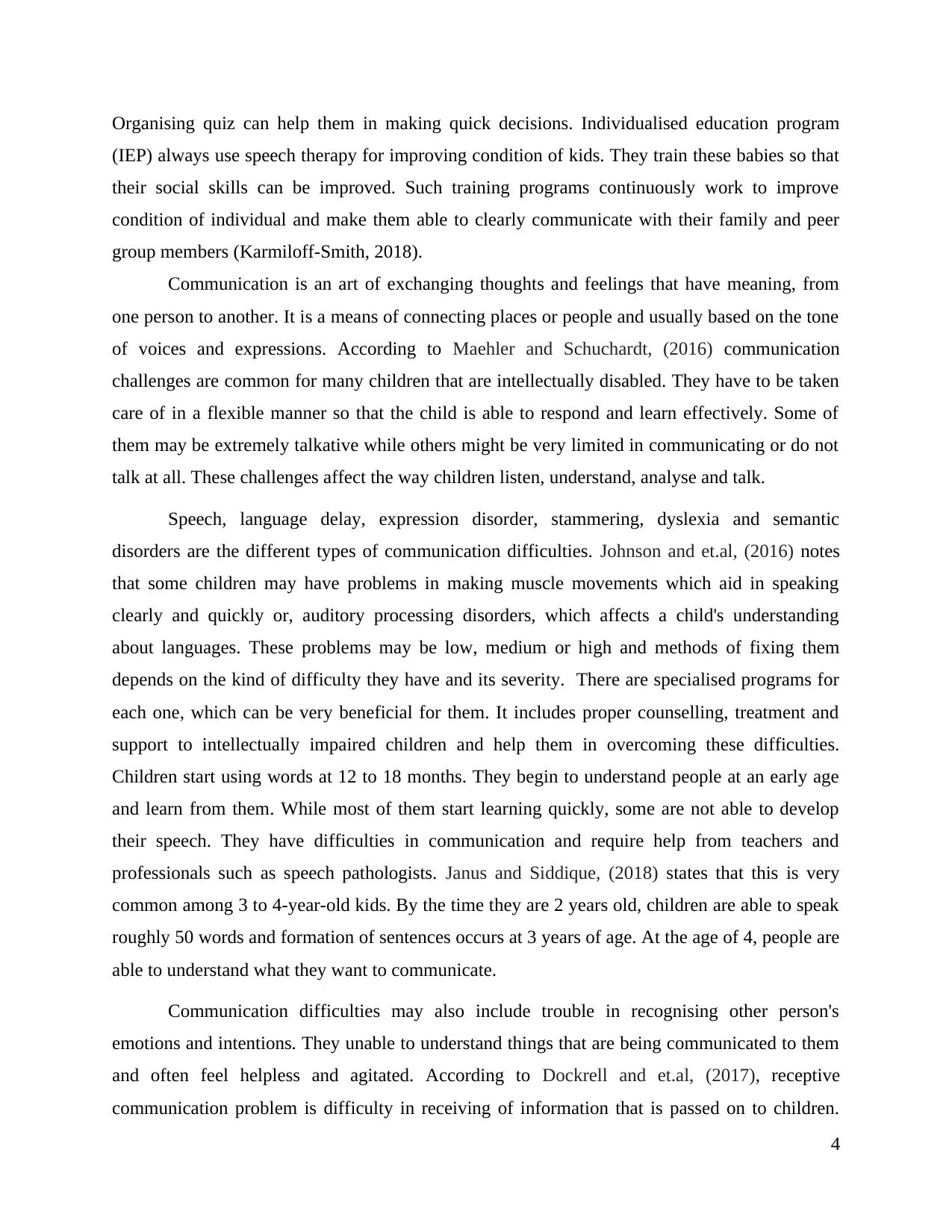
Organising quiz can help them in making quick decisions. Individualised education program
(IEP) always use speech therapy for improving condition of kids. They train these babies so that
their social skills can be improved. Such training programs continuously work to improve
condition of individual and make them able to clearly communicate with their family and peer
group members (Karmiloff-Smith, 2018).
Communication is an art of exchanging thoughts and feelings that have meaning, from
one person to another. It is a means of connecting places or people and usually based on the tone
of voices and expressions. According to Maehler and Schuchardt, (2016) communication
challenges are common for many children that are intellectually disabled. They have to be taken
care of in a flexible manner so that the child is able to respond and learn effectively. Some of
them may be extremely talkative while others might be very limited in communicating or do not
talk at all. These challenges affect the way children listen, understand, analyse and talk.
Speech, language delay, expression disorder, stammering, dyslexia and semantic
disorders are the different types of communication difficulties. Johnson and et.al, (2016) notes
that some children may have problems in making muscle movements which aid in speaking
clearly and quickly or, auditory processing disorders, which affects a child's understanding
about languages. These problems may be low, medium or high and methods of fixing them
depends on the kind of difficulty they have and its severity. There are specialised programs for
each one, which can be very beneficial for them. It includes proper counselling, treatment and
support to intellectually impaired children and help them in overcoming these difficulties.
Children start using words at 12 to 18 months. They begin to understand people at an early age
and learn from them. While most of them start learning quickly, some are not able to develop
their speech. They have difficulties in communication and require help from teachers and
professionals such as speech pathologists. Janus and Siddique, (2018) states that this is very
common among 3 to 4-year-old kids. By the time they are 2 years old, children are able to speak
roughly 50 words and formation of sentences occurs at 3 years of age. At the age of 4, people are
able to understand what they want to communicate.
Communication difficulties may also include trouble in recognising other person's
emotions and intentions. They unable to understand things that are being communicated to them
and often feel helpless and agitated. According to Dockrell and et.al, (2017), receptive
communication problem is difficulty in receiving of information that is passed on to children.
4
(IEP) always use speech therapy for improving condition of kids. They train these babies so that
their social skills can be improved. Such training programs continuously work to improve
condition of individual and make them able to clearly communicate with their family and peer
group members (Karmiloff-Smith, 2018).
Communication is an art of exchanging thoughts and feelings that have meaning, from
one person to another. It is a means of connecting places or people and usually based on the tone
of voices and expressions. According to Maehler and Schuchardt, (2016) communication
challenges are common for many children that are intellectually disabled. They have to be taken
care of in a flexible manner so that the child is able to respond and learn effectively. Some of
them may be extremely talkative while others might be very limited in communicating or do not
talk at all. These challenges affect the way children listen, understand, analyse and talk.
Speech, language delay, expression disorder, stammering, dyslexia and semantic
disorders are the different types of communication difficulties. Johnson and et.al, (2016) notes
that some children may have problems in making muscle movements which aid in speaking
clearly and quickly or, auditory processing disorders, which affects a child's understanding
about languages. These problems may be low, medium or high and methods of fixing them
depends on the kind of difficulty they have and its severity. There are specialised programs for
each one, which can be very beneficial for them. It includes proper counselling, treatment and
support to intellectually impaired children and help them in overcoming these difficulties.
Children start using words at 12 to 18 months. They begin to understand people at an early age
and learn from them. While most of them start learning quickly, some are not able to develop
their speech. They have difficulties in communication and require help from teachers and
professionals such as speech pathologists. Janus and Siddique, (2018) states that this is very
common among 3 to 4-year-old kids. By the time they are 2 years old, children are able to speak
roughly 50 words and formation of sentences occurs at 3 years of age. At the age of 4, people are
able to understand what they want to communicate.
Communication difficulties may also include trouble in recognising other person's
emotions and intentions. They unable to understand things that are being communicated to them
and often feel helpless and agitated. According to Dockrell and et.al, (2017), receptive
communication problem is difficulty in receiving of information that is passed on to children.
4
⊘ This is a preview!⊘
Do you want full access?
Subscribe today to unlock all pages.

Trusted by 1+ million students worldwide
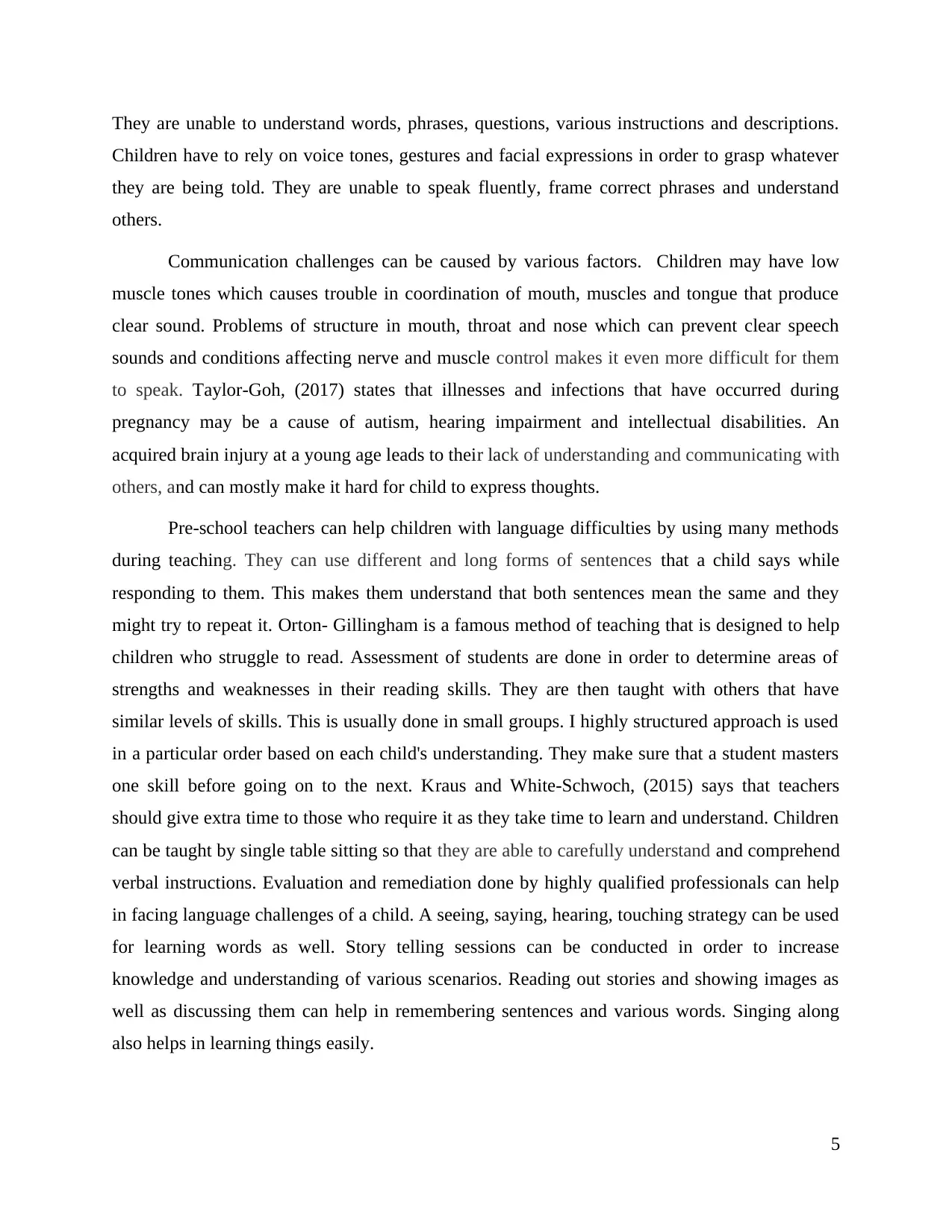
They are unable to understand words, phrases, questions, various instructions and descriptions.
Children have to rely on voice tones, gestures and facial expressions in order to grasp whatever
they are being told. They are unable to speak fluently, frame correct phrases and understand
others.
Communication challenges can be caused by various factors. Children may have low
muscle tones which causes trouble in coordination of mouth, muscles and tongue that produce
clear sound. Problems of structure in mouth, throat and nose which can prevent clear speech
sounds and conditions affecting nerve and muscle control makes it even more difficult for them
to speak. Taylor-Goh, (2017) states that illnesses and infections that have occurred during
pregnancy may be a cause of autism, hearing impairment and intellectual disabilities. An
acquired brain injury at a young age leads to their lack of understanding and communicating with
others, and can mostly make it hard for child to express thoughts.
Pre-school teachers can help children with language difficulties by using many methods
during teaching. They can use different and long forms of sentences that a child says while
responding to them. This makes them understand that both sentences mean the same and they
might try to repeat it. Orton- Gillingham is a famous method of teaching that is designed to help
children who struggle to read. Assessment of students are done in order to determine areas of
strengths and weaknesses in their reading skills. They are then taught with others that have
similar levels of skills. This is usually done in small groups. I highly structured approach is used
in a particular order based on each child's understanding. They make sure that a student masters
one skill before going on to the next. Kraus and White-Schwoch, (2015) says that teachers
should give extra time to those who require it as they take time to learn and understand. Children
can be taught by single table sitting so that they are able to carefully understand and comprehend
verbal instructions. Evaluation and remediation done by highly qualified professionals can help
in facing language challenges of a child. A seeing, saying, hearing, touching strategy can be used
for learning words as well. Story telling sessions can be conducted in order to increase
knowledge and understanding of various scenarios. Reading out stories and showing images as
well as discussing them can help in remembering sentences and various words. Singing along
also helps in learning things easily.
5
Children have to rely on voice tones, gestures and facial expressions in order to grasp whatever
they are being told. They are unable to speak fluently, frame correct phrases and understand
others.
Communication challenges can be caused by various factors. Children may have low
muscle tones which causes trouble in coordination of mouth, muscles and tongue that produce
clear sound. Problems of structure in mouth, throat and nose which can prevent clear speech
sounds and conditions affecting nerve and muscle control makes it even more difficult for them
to speak. Taylor-Goh, (2017) states that illnesses and infections that have occurred during
pregnancy may be a cause of autism, hearing impairment and intellectual disabilities. An
acquired brain injury at a young age leads to their lack of understanding and communicating with
others, and can mostly make it hard for child to express thoughts.
Pre-school teachers can help children with language difficulties by using many methods
during teaching. They can use different and long forms of sentences that a child says while
responding to them. This makes them understand that both sentences mean the same and they
might try to repeat it. Orton- Gillingham is a famous method of teaching that is designed to help
children who struggle to read. Assessment of students are done in order to determine areas of
strengths and weaknesses in their reading skills. They are then taught with others that have
similar levels of skills. This is usually done in small groups. I highly structured approach is used
in a particular order based on each child's understanding. They make sure that a student masters
one skill before going on to the next. Kraus and White-Schwoch, (2015) says that teachers
should give extra time to those who require it as they take time to learn and understand. Children
can be taught by single table sitting so that they are able to carefully understand and comprehend
verbal instructions. Evaluation and remediation done by highly qualified professionals can help
in facing language challenges of a child. A seeing, saying, hearing, touching strategy can be used
for learning words as well. Story telling sessions can be conducted in order to increase
knowledge and understanding of various scenarios. Reading out stories and showing images as
well as discussing them can help in remembering sentences and various words. Singing along
also helps in learning things easily.
5
Paraphrase This Document
Need a fresh take? Get an instant paraphrase of this document with our AI Paraphraser
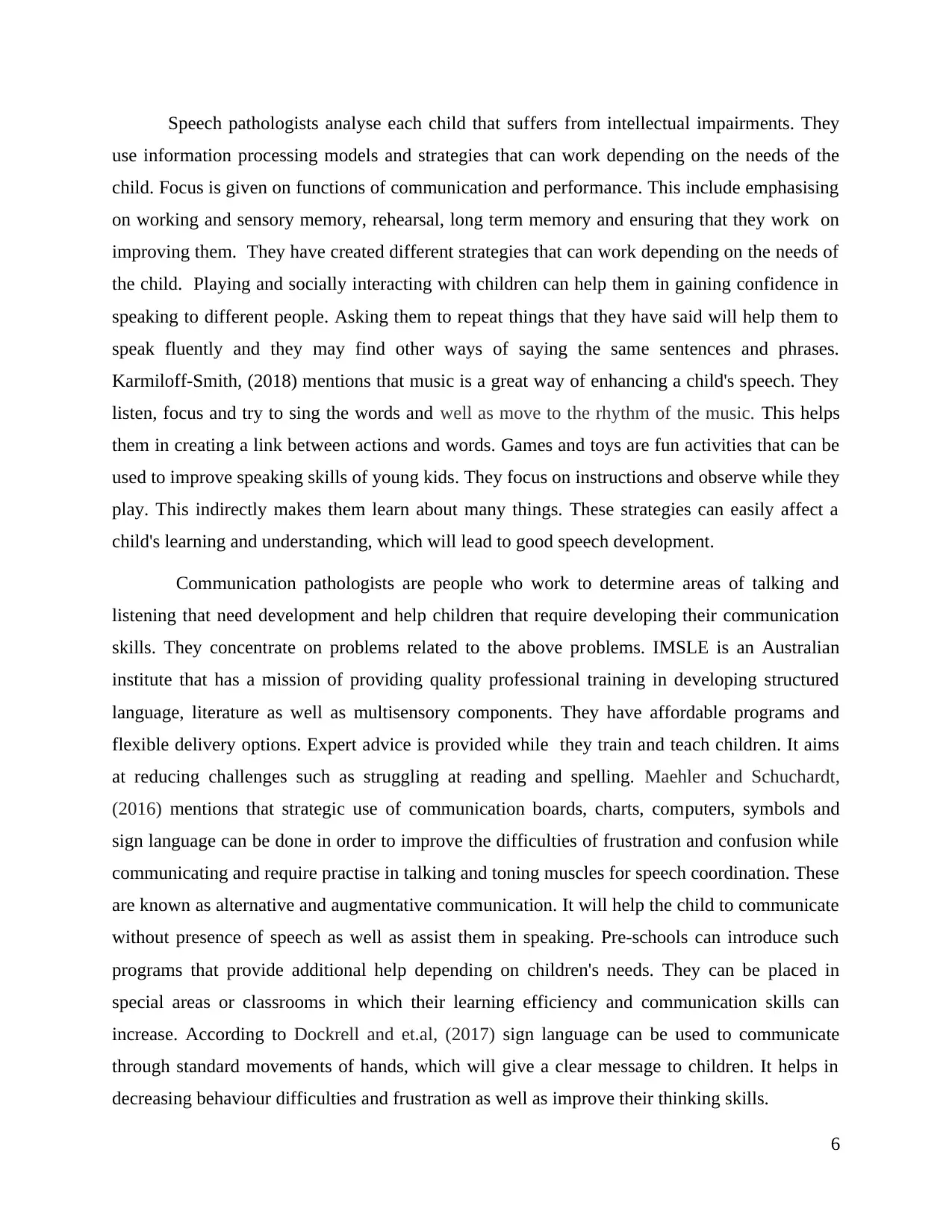
Speech pathologists analyse each child that suffers from intellectual impairments. They
use information processing models and strategies that can work depending on the needs of the
child. Focus is given on functions of communication and performance. This include emphasising
on working and sensory memory, rehearsal, long term memory and ensuring that they work on
improving them. They have created different strategies that can work depending on the needs of
the child. Playing and socially interacting with children can help them in gaining confidence in
speaking to different people. Asking them to repeat things that they have said will help them to
speak fluently and they may find other ways of saying the same sentences and phrases.
Karmiloff-Smith, (2018) mentions that music is a great way of enhancing a child's speech. They
listen, focus and try to sing the words and well as move to the rhythm of the music. This helps
them in creating a link between actions and words. Games and toys are fun activities that can be
used to improve speaking skills of young kids. They focus on instructions and observe while they
play. This indirectly makes them learn about many things. These strategies can easily affect a
child's learning and understanding, which will lead to good speech development.
Communication pathologists are people who work to determine areas of talking and
listening that need development and help children that require developing their communication
skills. They concentrate on problems related to the above problems. IMSLE is an Australian
institute that has a mission of providing quality professional training in developing structured
language, literature as well as multisensory components. They have affordable programs and
flexible delivery options. Expert advice is provided while they train and teach children. It aims
at reducing challenges such as struggling at reading and spelling. Maehler and Schuchardt,
(2016) mentions that strategic use of communication boards, charts, computers, symbols and
sign language can be done in order to improve the difficulties of frustration and confusion while
communicating and require practise in talking and toning muscles for speech coordination. These
are known as alternative and augmentative communication. It will help the child to communicate
without presence of speech as well as assist them in speaking. Pre-schools can introduce such
programs that provide additional help depending on children's needs. They can be placed in
special areas or classrooms in which their learning efficiency and communication skills can
increase. According to Dockrell and et.al, (2017) sign language can be used to communicate
through standard movements of hands, which will give a clear message to children. It helps in
decreasing behaviour difficulties and frustration as well as improve their thinking skills.
6
use information processing models and strategies that can work depending on the needs of the
child. Focus is given on functions of communication and performance. This include emphasising
on working and sensory memory, rehearsal, long term memory and ensuring that they work on
improving them. They have created different strategies that can work depending on the needs of
the child. Playing and socially interacting with children can help them in gaining confidence in
speaking to different people. Asking them to repeat things that they have said will help them to
speak fluently and they may find other ways of saying the same sentences and phrases.
Karmiloff-Smith, (2018) mentions that music is a great way of enhancing a child's speech. They
listen, focus and try to sing the words and well as move to the rhythm of the music. This helps
them in creating a link between actions and words. Games and toys are fun activities that can be
used to improve speaking skills of young kids. They focus on instructions and observe while they
play. This indirectly makes them learn about many things. These strategies can easily affect a
child's learning and understanding, which will lead to good speech development.
Communication pathologists are people who work to determine areas of talking and
listening that need development and help children that require developing their communication
skills. They concentrate on problems related to the above problems. IMSLE is an Australian
institute that has a mission of providing quality professional training in developing structured
language, literature as well as multisensory components. They have affordable programs and
flexible delivery options. Expert advice is provided while they train and teach children. It aims
at reducing challenges such as struggling at reading and spelling. Maehler and Schuchardt,
(2016) mentions that strategic use of communication boards, charts, computers, symbols and
sign language can be done in order to improve the difficulties of frustration and confusion while
communicating and require practise in talking and toning muscles for speech coordination. These
are known as alternative and augmentative communication. It will help the child to communicate
without presence of speech as well as assist them in speaking. Pre-schools can introduce such
programs that provide additional help depending on children's needs. They can be placed in
special areas or classrooms in which their learning efficiency and communication skills can
increase. According to Dockrell and et.al, (2017) sign language can be used to communicate
through standard movements of hands, which will give a clear message to children. It helps in
decreasing behaviour difficulties and frustration as well as improve their thinking skills.
6
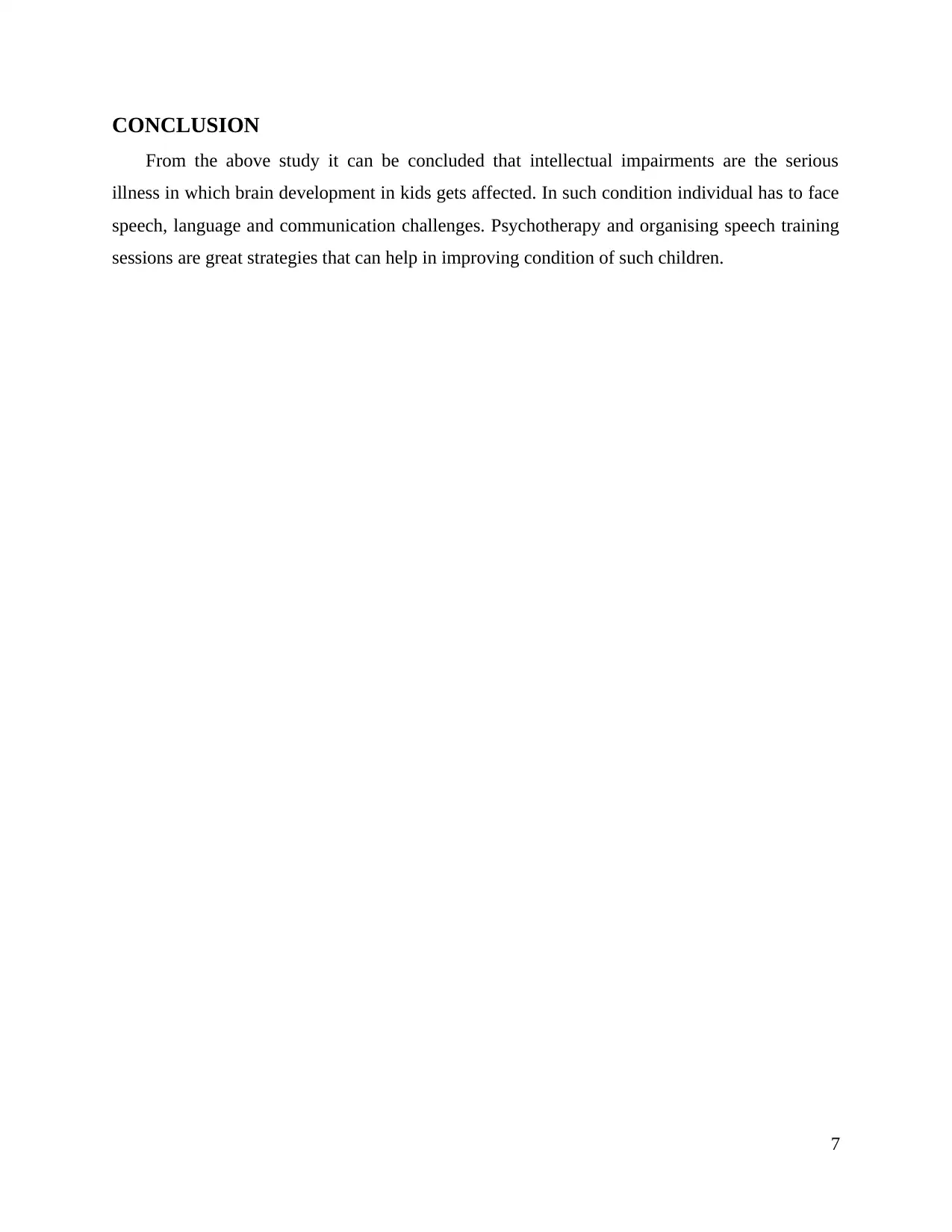
CONCLUSION
From the above study it can be concluded that intellectual impairments are the serious
illness in which brain development in kids gets affected. In such condition individual has to face
speech, language and communication challenges. Psychotherapy and organising speech training
sessions are great strategies that can help in improving condition of such children.
7
From the above study it can be concluded that intellectual impairments are the serious
illness in which brain development in kids gets affected. In such condition individual has to face
speech, language and communication challenges. Psychotherapy and organising speech training
sessions are great strategies that can help in improving condition of such children.
7
⊘ This is a preview!⊘
Do you want full access?
Subscribe today to unlock all pages.

Trusted by 1+ million students worldwide
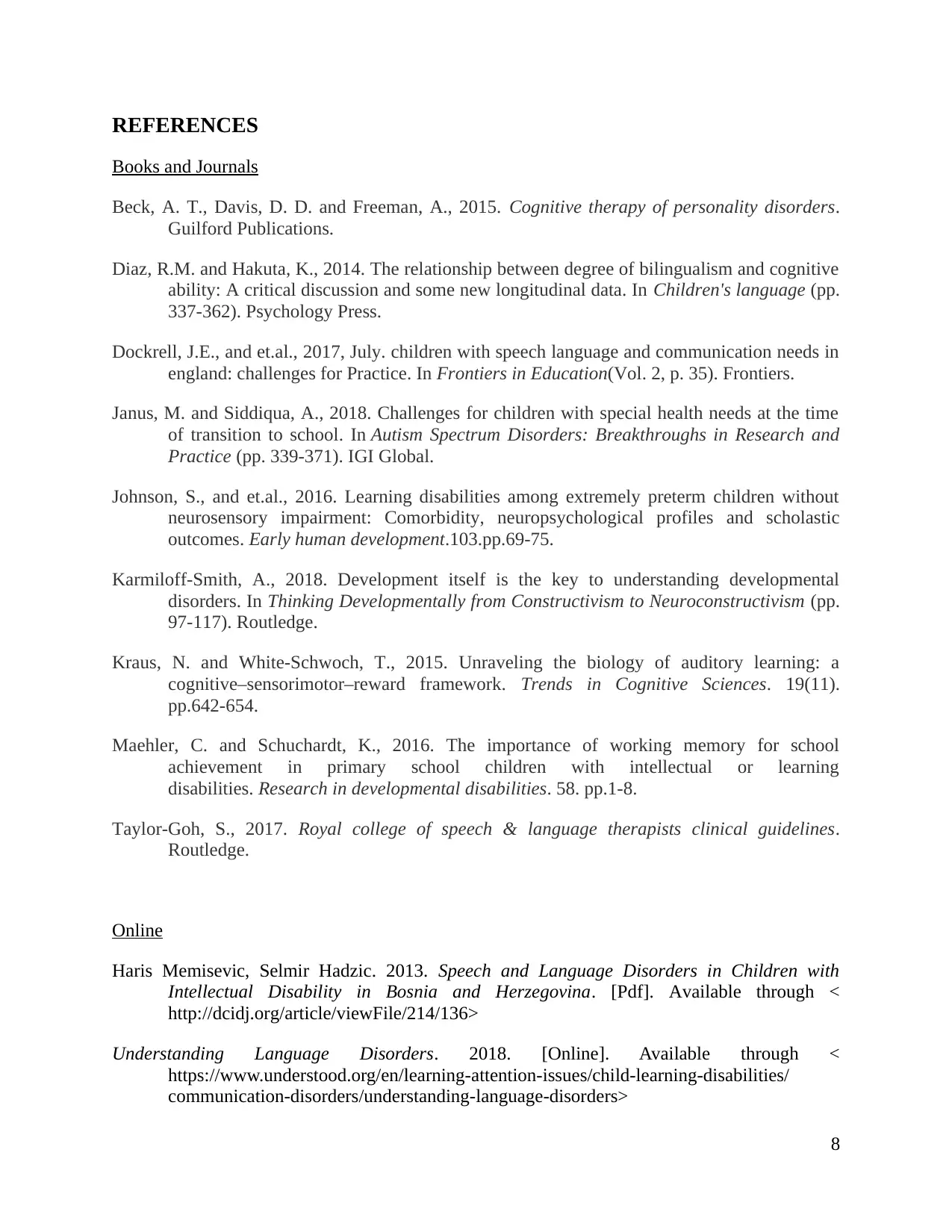
REFERENCES
Books and Journals
Beck, A. T., Davis, D. D. and Freeman, A., 2015. Cognitive therapy of personality disorders.
Guilford Publications.
Diaz, R.M. and Hakuta, K., 2014. The relationship between degree of bilingualism and cognitive
ability: A critical discussion and some new longitudinal data. In Children's language (pp.
337-362). Psychology Press.
Dockrell, J.E., and et.al., 2017, July. children with speech language and communication needs in
england: challenges for Practice. In Frontiers in Education(Vol. 2, p. 35). Frontiers.
Janus, M. and Siddiqua, A., 2018. Challenges for children with special health needs at the time
of transition to school. In Autism Spectrum Disorders: Breakthroughs in Research and
Practice (pp. 339-371). IGI Global.
Johnson, S., and et.al., 2016. Learning disabilities among extremely preterm children without
neurosensory impairment: Comorbidity, neuropsychological profiles and scholastic
outcomes. Early human development.103.pp.69-75.
Karmiloff-Smith, A., 2018. Development itself is the key to understanding developmental
disorders. In Thinking Developmentally from Constructivism to Neuroconstructivism (pp.
97-117). Routledge.
Kraus, N. and White-Schwoch, T., 2015. Unraveling the biology of auditory learning: a
cognitive–sensorimotor–reward framework. Trends in Cognitive Sciences. 19(11).
pp.642-654.
Maehler, C. and Schuchardt, K., 2016. The importance of working memory for school
achievement in primary school children with intellectual or learning
disabilities. Research in developmental disabilities. 58. pp.1-8.
Taylor-Goh, S., 2017. Royal college of speech & language therapists clinical guidelines.
Routledge.
Online
Haris Memisevic, Selmir Hadzic. 2013. Speech and Language Disorders in Children with
Intellectual Disability in Bosnia and Herzegovina. [Pdf]. Available through <
http://dcidj.org/article/viewFile/214/136>
Understanding Language Disorders. 2018. [Online]. Available through <
https://www.understood.org/en/learning-attention-issues/child-learning-disabilities/
communication-disorders/understanding-language-disorders>
8
Books and Journals
Beck, A. T., Davis, D. D. and Freeman, A., 2015. Cognitive therapy of personality disorders.
Guilford Publications.
Diaz, R.M. and Hakuta, K., 2014. The relationship between degree of bilingualism and cognitive
ability: A critical discussion and some new longitudinal data. In Children's language (pp.
337-362). Psychology Press.
Dockrell, J.E., and et.al., 2017, July. children with speech language and communication needs in
england: challenges for Practice. In Frontiers in Education(Vol. 2, p. 35). Frontiers.
Janus, M. and Siddiqua, A., 2018. Challenges for children with special health needs at the time
of transition to school. In Autism Spectrum Disorders: Breakthroughs in Research and
Practice (pp. 339-371). IGI Global.
Johnson, S., and et.al., 2016. Learning disabilities among extremely preterm children without
neurosensory impairment: Comorbidity, neuropsychological profiles and scholastic
outcomes. Early human development.103.pp.69-75.
Karmiloff-Smith, A., 2018. Development itself is the key to understanding developmental
disorders. In Thinking Developmentally from Constructivism to Neuroconstructivism (pp.
97-117). Routledge.
Kraus, N. and White-Schwoch, T., 2015. Unraveling the biology of auditory learning: a
cognitive–sensorimotor–reward framework. Trends in Cognitive Sciences. 19(11).
pp.642-654.
Maehler, C. and Schuchardt, K., 2016. The importance of working memory for school
achievement in primary school children with intellectual or learning
disabilities. Research in developmental disabilities. 58. pp.1-8.
Taylor-Goh, S., 2017. Royal college of speech & language therapists clinical guidelines.
Routledge.
Online
Haris Memisevic, Selmir Hadzic. 2013. Speech and Language Disorders in Children with
Intellectual Disability in Bosnia and Herzegovina. [Pdf]. Available through <
http://dcidj.org/article/viewFile/214/136>
Understanding Language Disorders. 2018. [Online]. Available through <
https://www.understood.org/en/learning-attention-issues/child-learning-disabilities/
communication-disorders/understanding-language-disorders>
8
1 out of 10
Related Documents
Your All-in-One AI-Powered Toolkit for Academic Success.
+13062052269
info@desklib.com
Available 24*7 on WhatsApp / Email
![[object Object]](/_next/static/media/star-bottom.7253800d.svg)
Unlock your academic potential
Copyright © 2020–2026 A2Z Services. All Rights Reserved. Developed and managed by ZUCOL.




